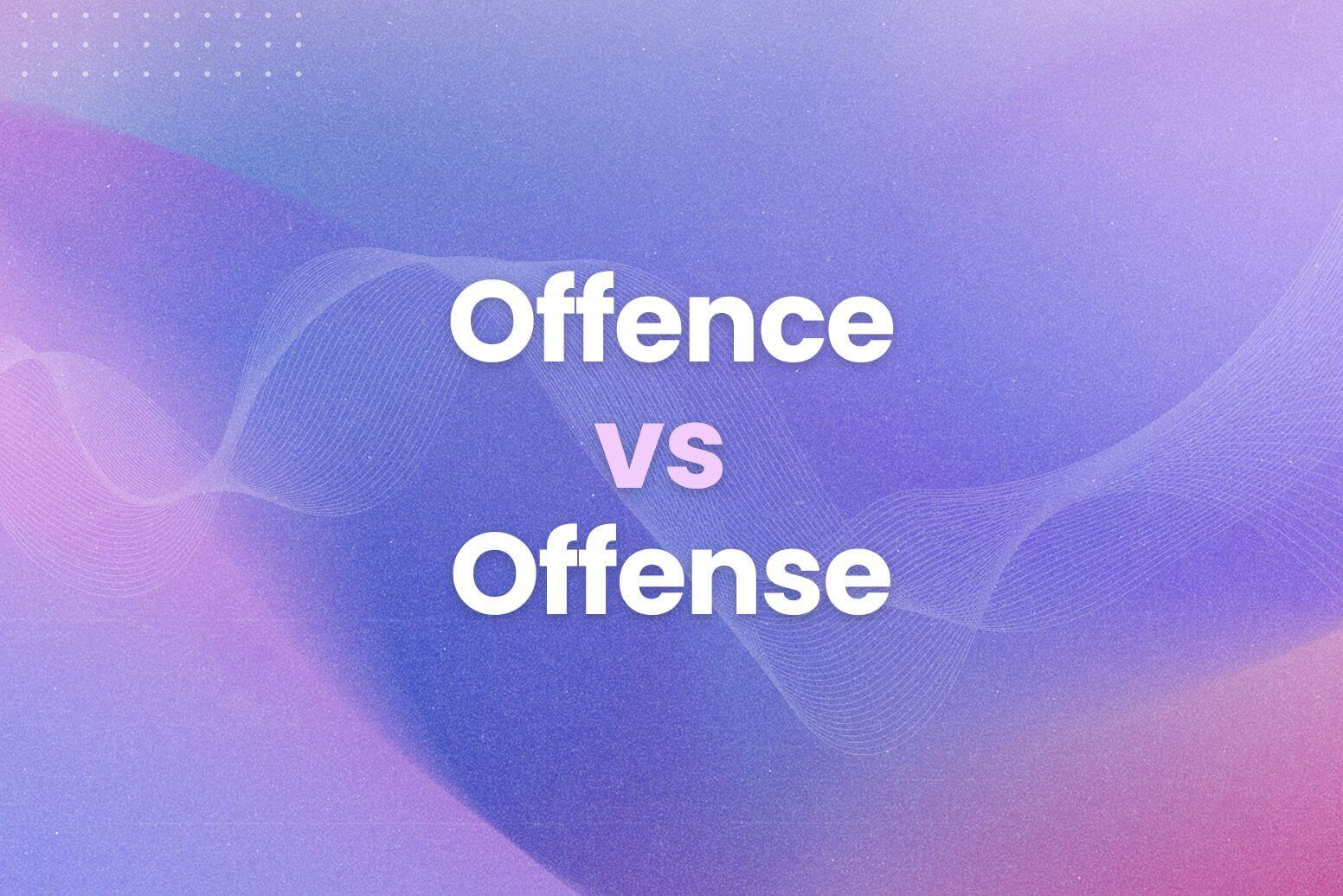Is it offence or offense? This spelling question plagues many. It’s easy to get tripped up by these similar words “offence vs offense”. But don’t worry, you’re not alone.
We’re here to provide clarity and help you choose the right spelling every time. Here’s a quick look at what we’ll explore:
- The offence vs offense breakdown
- Regional spelling variations explained
- Memory tricks for choosing the correct form
- How to avoid future mistakes like this.
The Offence vs Offense Breakdown
Let’s get straight to the point: offence and offense are both correct, but their usage depends on where you are in the world. This regional difference is the root of the confusion.
- Offence is the preferred spelling in British English and Commonwealth countries (like Canada and Australia).
- Offense is the standard spelling in American English.
So, if you’re writing for a British or Commonwealth audience, stick with offence. If your audience is primarily American, offense is the way to go. This simple rule can clear up most of the uncertainty surrounding these words. For instance, a Canadian might write about a “criminal offence,” while an American would likely refer to a “criminal offense.” Likewise, a British newspaper might discuss a team’s “offensive strategy,” while an American sports channel would analyze their “offensive strategy.”
This difference isn’t just about spelling; it impacts related words, too. For example, the adjective form is “offensive” in both American and British English. However, the noun referring to the act of offending can be either “offence” or “offense” depending on the region. Therefore, understanding your target audience is key to choosing the correct spelling.
Regional Spelling Variations Explained
As we’ve established, the offence/offense divide primarily comes down to regional differences. British English and its Commonwealth cousins favor offence, while American English uses offense. This isn’t a recent development; it’s a historical quirk.
The distinction arose from variations in how Noah Webster, the father of American dictionaries, standardized spelling in the United States in the early 19th century. Webster aimed to create a uniquely American English, distinct from British English. He simplified spellings, often dropping the “u” in words like “colour” (becoming “color”) and, yes, “offence” (becoming “offense”).
This change wasn’t universally adopted in the UK and its territories. Consequently, the “u” remained in many words, including “offence.” So, the next time you encounter this spelling difference, remember it’s not a matter of right or wrong, but a reflection of different linguistic traditions. For example, you might see “motor offence” in a UK news article and “traffic offense” in a US news report. Both are correct within their respective contexts.
Memory Tricks for Choosing the Correct Form
Now that you know the difference, how do you remember which spelling to use? Here are a few memory tricks to help you out:
- Think “American Offense”: The alliteration can help you remember that offense is the American spelling. Similarly, you can remember British English uses “offence.”
- Visualize the “c” in “offence”: The “c” can remind you of “Commonwealth,” where offence is common.
- Consider your audience: If you’re writing for an American audience, offense is your go-to. For British or Commonwealth readers, offence is the correct choice. This is the most practical and reliable method.
- Use a grammar tool: Tools like Arvin can be a lifesaver. Arvin’s grammar check will flag any spelling errors and even offer suggestions based on your chosen style guide (American or British English). This is especially helpful when you’re unsure or want a quick double-check.
- For example, if you accidentally type “offence” when writing for an American audience, Arvin will quickly point out the potential error and suggest “offense.” This feature can save you time and embarrassment.
These tricks can help solidify the correct spelling in your mind. However, when in doubt, consulting a dictionary or using a grammar checker like Arvin is always a good idea.
How to Avoid Future Mistakes Like This
You’ve learned the difference between offence and offense, and you’ve picked up some memory tricks. But how do you make sure you don’t slip up in the future? Here’s a strategy for long-term spelling success:
- Be mindful of your audience: Before you start writing, determine who you’re writing for. Is it a primarily American audience? Or a British/Commonwealth one? Keeping your audience in mind is the most effective way to choose the right spelling.
- Set your writing tools: Most word processors and grammar checkers (like Arvin) allow you to set your language preferences. Choose either American or British English, and the tool will automatically flag any spelling inconsistencies. This is a proactive way to catch errors before they become a problem. For instance, in Arvin, you can specify your preferred English dialect, and it will adjust its suggestions accordingly.
- Double-check your work: Even with these tools, it’s always a good idea to proofread your writing carefully. Pay special attention to words like offence/offense, and make sure they align with your intended audience.
- Practice makes perfect: The more you write, the more comfortable you’ll become with the correct spellings. So, keep writing, and don’t be afraid to use resources like dictionaries and grammar checkers to reinforce your knowledge. Over time, the correct spellings will become second nature.
By following these tips, you can confidently use offence and offense correctly, every time.
Master Offence vs Offense Once and For All with Arvin
The offence vs offense mystery is solved. Remember, it’s all about location, location, location. British English and its Commonwealth friends use offence, while American English prefers offense.
Here’s a quick recap on offence vs offense:
- Firstly, offence is British English.
- Secondly, offense is American English.
- Then, audience matters most.
- Lastly, grammar tools are your friend.
Now, you can confidently choose the correct spelling, no matter what you’re writing. And for extra peace of mind (and to make your writing shine even brighter), Arvin is always there.
Its AI-powered grammar check can instantly catch any spelling slip-ups and ensure your writing is polished and professional. Whether you’re using “offence” or “offense.” Plus, with Arvin’s other features like translation and text generation, it’s a one-stop shop for all your writing needs.
FAQs About Offence vs Offense
What is the difference between offence and offense?
Essentially, the difference is purely spelling. Offence is used in British English and Commonwealth countries, while offense is the standard spelling in American English. Therefore, the meaning is the same; only the spelling varies depending on the region.
Do you take offence or offense?
This depends on where you are and who you’re talking to. In the US, you’d say “take offense.” However, in the UK and Commonwealth countries, “take offence” is the correct phrasing.
Is it offense or offence in sports?
Again, it depends on the region. American sports commentators will talk about a team’s “offense,” while British or Commonwealth commentators will refer to their “offence.” Consequently, both are correct within their respective contexts.
How do you spell offence in Canada?
In Canada, as in other Commonwealth countries, the correct spelling is offence. So, if you’re writing for a Canadian audience, be sure to use the “c.”






